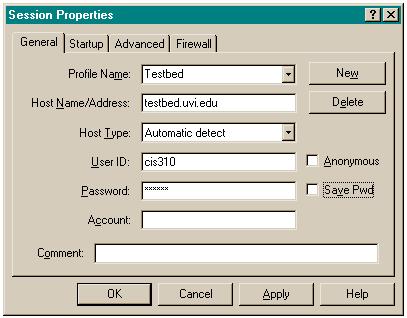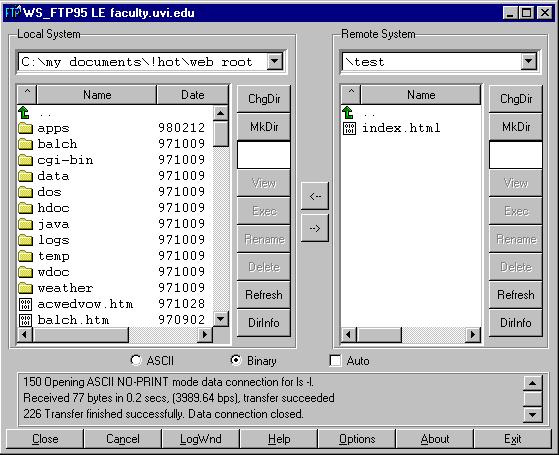Configuring and Using WS_FTP For testbed.uvi.edu
This page will take you step-by-step through the process of
configuring WS_FTP to transfer files back and forth between your local computer
and testbed.uvi.edu. The following instructions assume that
you are already connected to the internet. If you can use a web browser
or check your email, you are connected.
Step 1 - Install
WS_FTP
Download WSFTP LE from Ipswitch or
Tucows into a known directory then install the software.
There is a pro version but get the light (LE) as it is free and does all you need.
I suggest you use Windows Explorer to create a folder named downloads.
Accept all the default settings.
Step 2 - Start / Configure
WS_FTP
When you launch WS_FTP you will be
automatically taken to the session profile that looks something like

Complete your Session Properties using
| Profile Name | UVI Testbed |
| Host Name/Address | testbed.uvi.edu |
| Host Type | Automatic Detect |
| User ID | ClassName (I.E. CIS310 or CIS357) |
| Password | ClassName |
Once these settings are correct, click
the OK button to connect to your testbed.uvi.edu account.
That's it. You should not have to
install or configure WSFTP again. You may wish to place a shortcut to the
program in your program or computer folder.
Step 3 - Moving Files Back And
Forth
Once you click the OK button your
sreen should look something like this:

The window on the left side shows the contents of the
disk on your local system, and the window on the right shows the testbed.uvi.edu home
directory. To move files, select the file you wish to move, then click once on
the arrow between the two columns which points in the direction that you wish to
transfer the file.
Handy Features
WS_FTP also allows you to do other useful things with the to the right of the windows.
Create new directories (MkDir),
Delete existing directories (RmDir),
Delete files/direcories (Delete ),
Rename files/directories (Rename)
Step 4 - Ending Your FTP
Session
To disconnect from the faculty.uvi.edu FTP server, click
on the Close or Exit buttons at
the bottom of the screen.


